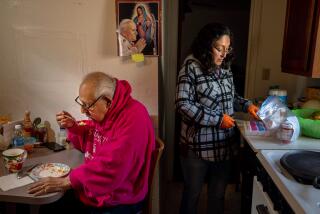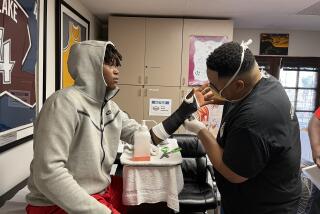In Midst of Wealth, They Help the Needy : Health: On South Carolina’s posh Hilton Head Island, retired physicians volunteer to help the less fortunate.
- Share via
HILTON HEAD ISLAND, S.C. — Seven-month-old Esphanie Belman is feverish and crying, and Dr. Jeanne Audet can’t figure out why. It doesn’t help that Audet doesn’t speak Spanish, and Esphanie’s parents don’t speak English.
Finally, a 9-year-old Hispanic patient in for a routine checkup comes to the rescue and acts as translator. Audet makes her diagnosis and sends the family on its way.
“I should learn some Spanish,” Audet laments, “but I think I might be too old for that.”
At 73, language study might be the only thing she feels she’s not up to.
Audet is one of a pool of retired physicians, nurses and lay people working at the Volunteers in Medicine Clinic, the brainchild of Dr. Jack McConnell.
On an island best known for its golf courses, tennis clubs and wealthy residents, McConnell uncovered a population of 6,000 to 8,000 people whose medical needs were not being met. He also discovered a group of retired physicians who were meeting once a week for lectures and companionship.
“The Hilton Head community had a problem, but it also had the resources to address that problem,” explains medical director Dr. Diane Montella, one of five paid workers at the clinic.
McConnell pitched his idea of a free primary-care clinic staffed by retired medical professionals to the Retired Physicians Club in 1992. Two years later, it was a reality.
Along the way, the South Carolina General Assembly passed a bill to waive license fees and a state test for out-of-state physicians, essentially creating a special license for volunteers. In addition, the state’s Good Samaritan Law, which capped malpractice awards for free medical emergency care, was extended to cover the volunteers, resulting in low malpractice fees.
Endowments and donations brought in more than $500,000 to build and start the clinic. When it opened last July, Audet, a retired pediatrician and the mother of four grown children, was one of its first workers.
“There’s a need in a lot of us to get up in the morning and say, ‘I have this to do today,’ ” she says. “When VIM came along, it was a perfect fit.”
McConnell’s vision for the clinic went far beyond the concept of quality cost-free care.
“It starts with the understanding that the person who walks in that door for care is not a patient or a disease. They’re viewed as a friend and neighbor,” he says. “They want to come back because they know that they will be treated well, they’re going to get good care in a compassionate environment, and they will have as much or more dignity when they walk out as when they walked in.”
Those walking in for care must meet certain requirements: They must live or work on the island and have a total income of less than twice the federal poverty level. People uninsured or underinsured also are welcomed.
“Our review board looks for reasons to include people,” says Montella, “not exclude people.”
When it comes to care-giving, the retirees’ wisdom, experience and patience constitute a great benefit to their patients.
“We may not be up on the latest medical technology, but as far as diagnostic skills and appraisals, we are way ahead,” says Audet, who also sits on the clinic’s policy committee.
The retirees also keep up with current medical developments through weekly lectures at the clinic by doctors from across the country.
Another group that benefits from the retirees’ accumulated knowledge is the medical students the clinic has started to accept from various medical schools.
“The students we’ve had here think they’ve died and gone to heaven to have a chance to work with this staff in the old style of medicine--a time when you saw a patient because he was sick, not because he could pay you,” says Montella, who is 36.
Her admiration for Audet is clear.
“All the doctors look to her to bounce ideas around,” she says. “She’s a soft-spoken, nurturing person who’s flexible and willing to consider things outside her opinion. But when things need to be done properly, she sticks to her guns. That’s something I’d like to model in myself as a physician.”
Besides the staff and patients at the clinic, Audet has touched many lives through her other work on the island, where she landed in 1991 after retiring from the Waterbury, Conn.-based practice she shared with her husband, Robert.
“When I retired, I wanted to be able to go back to school and to do some teaching, and that was all right here,” she says with delight.
Audet teaches astronomy and has developed a children’s nature program through the Museum of Hilton Head. She also instructs some classes, most recently one in the history of plants as medicine, at the Creative Retirement Center, an education program for seniors. She has a monthly astronomy show on an island radio station and is taking a class in computer science.
“People are like sponges here,” she says. “They want to learn all they can.”
But her most fulfilling work is at the clinic. Whether it’s conferring with her colleagues or trying to diagnose a child’s fever, she relishes her time within its walls.
“I’ve had so many people as they walk out of my examining room say, ‘You’ve been so kind,’ ” Audet says. “That really gets me.”
More to Read
Sign up for Essential California
The most important California stories and recommendations in your inbox every morning.
You may occasionally receive promotional content from the Los Angeles Times.













